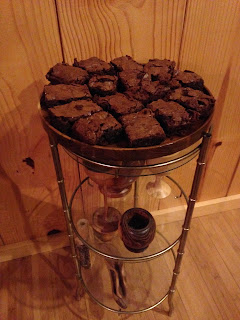I felt like an interloper at the Northwest Anthropological Conference in Portland last week. My Ph.D. is in English literature, a far cry from anthropolog. I kept reminding myself that I had been invited to give a paper there, on the topic of "How Hippie Food Changed the Way America Eats." I had done thorough research, and, besides, I had "lived experience," to use the academic term, from my years on a hippie commune. I could do this.
My paper was one of four on the session's topic, "Feeding the Masses in Oregon."
A week before the conference, I learned that the topic had changed. Now it was "Food as Weapon," which fit fine for the other three papers (Indian schools, school lunches, laws against feeding the homeless), but seemed irrelevant to hippie food. Calming my panic, the leader of the session suggested I use the phrase "food as a weapon of love," so I added it once or twice in the paper and let it be.
I was also dismayed to discover, when I got to the presentation room, that there was no podium and only a hand-held microphone. How could I hold my papers, turn pages, hold the microphone, and click through the Power Point slides at the same time? (All the presenters, of course, had the same problem.)
It was a little awkward, but I managed well enough, especially with a friend on the front row clicking through the slides for me.
And it was all a great success. The audience laughed at appropriate times; they enjoyed the photos. Afterward people spoke nostalgically about the cookbooks I had cited (Moosewood, Ten Talents, The Tassajara Bread Book) and told me that their parents had fed them hippie food. They told me about their trips to the Oregon Country Fair or about being in Eugene during that era. Later, during the day, I would pass someone in a hallway who would turn to me and say, "I enjoyed your talk."
Months ago, when I told people I was writing an article about hippie food, they often asked, "What is hippie food?" so my talk started with a description, from my "lived experience" on a commune in the mid-seventies, of sitting cross-legged on the floor with a group of hippies at dinner time, the cloth spread with brown rice, a stir-fry of fresh vegetables, salad from the garden, and the condiments: gomasio (ground sesame seeds), Dr. Bronner's, tamari, brewer's yeast. After dinner, I said, there might be carob brownies made with honey and whole wheat flour (and, sometimes, marijuana).
If these "hippie foods" are no longer identifiable as such (well, carob brownies, I guess, are still hippie food), it is because hippies changed the way Americans eat. As I noted in the conclusion of my paper:
"Today, even in supermarkets like Anderson's and Safeway you can find tofu, kale, soy sauce, and tahini, if not brewer's yeast and gomasio. Organic food is widely available, not only in co-ops (which hippies started) but also in supermarkets.
 |
| Ashland's farmers' market |
Farmers markets, another hippie introduction to Oregon, are now in large cities and tiny hamlets all over the state. The vitamin shop with herbal remedies on the street corner? Thank the hippies.
I don't know how much the audience of anthropologists learned that was relevant to their studies, but I do know that I entertained them with tales of the past and opened their eyes, perhaps, to the ways hippies did, indeed, change the way America eats. Thank the hippies.
 |
| Folks at the China Grade commune, where I lived, 1969-71. I am kneeling, with the goat. |



No comments:
Post a Comment